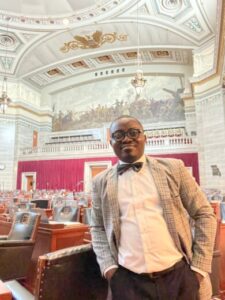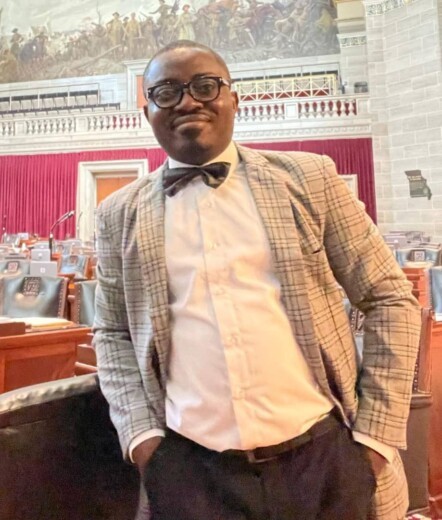By Ishola Balogun
Muritala Ayinla, an award-winning journalist and technology management expert, recently presented his thought-provoking research paper titled, “Google Maps: The ‘Unseen’ That Controls the Seen,” at the Conference of the Association of Technology, Management, and Applied Engineering (ATMAE) in Atlanta, Georgia. In this exclusive interview, Ayinla unpacks the power, paradoxes, and perils of global navigation technologies like Google Maps, Apple Maps, and Waze—technologies that now direct more than just traffic.
Your paper’s title is both intriguing and poetic. What inspired “The Unseen That Controls the Seen”?
The title captures the paradox of modern technology. Tools like Google Maps present themselves as visible, accessible aids. But behind the clean interface lies a complex, invisible network of algorithms, data structures, and real-time decision engines—unseen mechanisms that guide where we go, what we avoid, and even how we perceive the world around us.
We live in an age where abstaining from technology is nearly impossible. From how we navigate cities to how we structure our time, digital tools shape our actions and environments. Google Maps is a clear example. With its detailed maps, satellite imagery, traffic data, and turn-by-turn directions, it’s become an indispensable tool for drivers, commuters, tourists, and logistics professionals alike. Yet, its influence runs deeper than convenience—it subtly dictates our choices.
Why do you think global dependence on navigation technologies is growing so rapidly?
It’s because they work and they’re easy to use. My research draws on two theoretical frameworks: the Technology Acceptance Model (TAM) and the Media Dependency Theory.
READ ALSO: 2025 Int’l Youth Day: Idahosa wants tangible govt action on youth welfare
READ ALSO: Lifetime no-fly ban on Ibom-Air passenger Unconstitutional, disproportionate — Ubani, SAN
TAM explains how perceived usefulness and ease of use drive people to adopt new technologies. Google Maps exemplifies both—it’s intuitive, informative, and increasingly indispensable. It’s not just about finding a destination; it’s about exploring the world with a sense of confidence and control.
Media Dependency Theory, on the other hand, suggests that the more people depend on a medium to fulfill vital needs, the more central that medium becomes in their lives. When GPS apps meet our needs for safety, efficiency, and orientation, they become not just tools—but lifelines. Over time, people depend on these apps to the extent that they become lost without them, both literally and metaphorically.
Can you summarize the central argument of your research paper?
The core thesis is this: Google Maps and other GPS platforms are more than navigational aids. They are soft infrastructures that influence urban behavior, social geography, and human cognition. Their algorithms guide our movements, our awareness of space, and our daily decisions—often without us realizing it.
With more than a billion users monthly, Google Maps has reshaped how people interact with their environments. From avoiding traffic to discovering businesses, from planning road trips to making real-time commuting choices, users are increasingly deferring to what the app suggests. In doing so, they surrender autonomy to algorithms that are largely invisible and unaccountable.
You describe Google Maps as a “cultural artifact.” What do you mean by that?
A cultural artifact reflects, shapes, and encodes the values of the society that creates and uses it. Google Maps does more than reflect geography—it constructs a version of reality based on data, partnerships, politics, and algorithms. It determines which businesses are visible, which landmarks are highlighted, and even how contested borders are represented depending on the user’s location.
In essence, it doesn’t just tell us where we are—it tells us what matters, what’s available, and what’s possible. That’s a form of cultural authorship.
In what subtle or surprising ways does this technology shape our daily lives?
Take route decisions. We trust Google Maps to show us the “best” path—often the fastest. But we rarely question what that means. In doing so, we might be rerouted through fragile residential neighborhoods, increasing local traffic and affecting community dynamics. Over time, these patterns influence real estate, road maintenance priorities, and even policing.
Also, for small businesses, if you’re not on the map, you’re invisible. Consumers often assume what isn’t listed doesn’t exist. That’s a significant economic and social consequence of digital exclusion.
Are there dangers in our increasing reliance on GPS navigation?
Yes, several. There’s growing concern among neuroscientists and psychologists that over-reliance on navigation technology might erode our innate spatial reasoning and memory.
Humans have two brain systems for navigation—the hippocampus, which helps map environments, and the caudate nucleus, which tracks familiar routes and landmarks. If we’re constantly following automated directions, those brain regions may weaken from disuse. Researchers suggest this could lead to a form of cognitive atrophy over time, making people helpless without digital guidance.
There’s also the issue of decision-making. When a GPS app becomes your default authority, you lose the habit of critical thinking in unfamiliar contexts. That’s a subtle but real loss of independence.
How do Google Maps alternatives like Waze, Apple Maps, and Map.me compare?
Each platform has unique strengths. Waze is community-driven, relying heavily on user reports. Apple Maps prioritizes privacy and device integration. Map.me allows for offline navigation and appeals to travelers. But Google Maps remains the most comprehensive and widely used. Its dominance, however, brings challenges: surveillance concerns, centralization of data, and lack of user control over how maps evolve or are curated.
You’ve raised data privacy concerns. Can you elaborate?
Absolutely. Google Maps collects vast amounts of location data—often passively. While this improves accuracy and personalizes the experience, most users don’t fully understand how their data is used, stored, or shared. That information often feeds into broader advertising and behavioral profiling ecosystems.
So, while you’re getting a smoother drive, you may be offering up personal behavioral data without truly informed consent. The balance between convenience and privacy is dangerously lopsided.
You’ve referred to this as a kind of “digital colonization.” What does that mean?
When a single platform becomes the de facto gateway through which people experience and interpret geography, that’s a kind of digital colonization. It replaces local knowledge systems, erases nuances, and imposes a standardized view of the world. In regions where local cartographic efforts are limited, Google Maps becomes the only source of spatial truth—and that can disempower communities.
What are the ethical implications of such control?
There’s a deep need for transparency and accountability. Who decides what appears on the map? Who resolves inaccuracies or cultural disputes? When private tech companies act as gatekeepers of public knowledge and infrastructure, ethical oversight is essential. The lack of meaningful regulation or public input in how these systems operate is troubling.
What recommendations emerged from your study?
First, there needs to be a stronger partnership between governments and navigation platforms to ensure accurate, inclusive, and dynamic mapping—especially for construction zones, closed roads, or underserved areas.
Second, users need to be encouraged to rely less blindly on apps. Digital literacy campaigns should teach users to think critically, double-check routes, and remain alert. Overdependence can be disempowering and even dangerous.
Finally, tech developers should continue improving accessibility, adding local input features, and closing data gaps—especially in developing regions. Empowering communities to participate in their own mapping is key.
What are your next steps as a researcher?
I’m interested in exploring decentralized, community-based mapping projects and how digital geography differs between the Global North and Global South. I also plan to collaborate with urban planners and sociologists to better understand how digital navigation is reshaping cities, transportation, and social life.

Ultimately, I want to foster a more critical and participatory approach to how we map, and understand our world.

